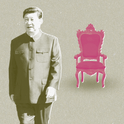Soon after the US invasion of Afghanistan in late 2001, Taliban and al Qaeda leaders were on the run. Now they are running free. In Afghanistan's eastern provinces, attacks are up by 40 per cent in the last several months, and more American soldiers are now dying in Afghanistan than in Iraq. By 2002, the Taliban were little more than a nuisance; today, they are encircling Kabul and ambushing convoys of supplies on their way to the capital, and have appeared in force in the neighbouring Wardak province. They are beginning to convince the population that international forces are losing control of the country.
One western diplomat in Kabul described Nato operations in the south of the country as "mowing the lawn." Every year, Nato forces go in and clear out Taliban sanctuaries, only to have to go back the following year and cut back the new growth. This deteriorating situation has, finally, grabbed the attention of American politicians. Both presidential candidates have called for a significant increase in the number of US troops in Afghanistan. But simply throwing more soldiers at the problem won't help unless the next occupant of the White House abandons our current stopgap approach, and initiates a "strategic reset" of the sort that helped the US military dampen the violence in Iraq.
To begin this reset, the west needs to understand its enemy. Today, the Taliban are not simply an Afghan movement. They are supported by a growing cast of foreign fighters, including Arabs, Uzbeks, Punjabi Pakistanis, and even Europeans, according to General David McKiernan, the commander of Nato forces in Afghanistan. Meanwhile, according to US intelligence reports, al Qaeda has regrouped along the porous Afghan-Pakistan border. Pakistan seems unable or unwilling to clamp down on leading militants in its territory, and jihadist attacks in Afghanistan and Pakistan have occurred with alarming frequency in the past year. More Pakistani citizens died as a result of militant violence in 2007 than in the previous five years combined.
Controlling the Taliban, in turn, is tied directly to a new approach toward Pakistan. As much as Pakistan suffers at the hands of Islamist insurgents, the country's powerful military intelligence agency, Inter-Services Intelligence (ISI), has tolerated the Taliban, which it views as a backup force for asserting control of Afghanistan if the US suddenly decides to cut and run. Therefore, in order to defeat the Taliban and al Qaeda, the US must start dealing with Afghanistan and Pakistan as one region, not separate entities.
Such a strategic reset will only be possible with more troops. In this, both American presidential candidates are correct. But neither John McCain's nor Barack Obama's public statements reflect the true size of the force required. Classic counterinsurgency doctrine suggests that Afghanistan needs something like half a million additional soldiers and policemen to secure its population. There are only 70,000 policemen in the entire country, which is wracked by a violent insurgency in its eastern, southern and, increasingly, central provinces, and is also the centre of the world's heroin trade. (New York City, by contrast, has some 40,000 policemen.)
Still, the answer is not a lot more American boots on the ground. Because the US military and Nato are now stretched to the breaking point, the Afghans must supply the vast majority of additional soldiers and policemen themselves. This raises a question being mulled by senior US military officials: could this security shortfall in Afghanistan be reversed by replicating the "Sons of Iraq" program, which helped dampen the insurgency in Iraq by putting on the US payroll 100,000 Sunni militants, who subsequently helped to decimate al Qaeda in Iraq? Yes and no. The Sons of Iraq were motivated not only by a US paycheck, but also because al Qaeda in Iraq had turned its guns against fellow Sunnis who did not share its ultra-fundamentalist views. However, the Taliban have not engendered anything like the intense anger among Afghans.
That doesn't mean the idea is without merit. According to a senior Afghan official, President Hamid Karzai is seriously considering the idea of establishing tribal militias of 50 to 300 men to establish security at district levels and provide a counterweight to local militants. The idea is potentially a good one: ordinary Afghans tend to trust their tribal shuras (councils) to solve their problems, and these "Sons of Afghanistan" could fill the security void until the Afghan army and police grew sufficiently in size and ability—a process likely to take many years. Such tribal militias could be paid with US funds, just as the Sons of Iraq have been. But the plan would have to be carefully implemented in order to avoid recreating the warlord-led militias that have been so successfully disbanded since the fall of the Taliban.
Overall, we should be clear about what would constitute a realistic victory. Even our most concerted efforts will not turn Afghanistan into Belgium, but we can prevent it from becoming a safe haven for al Qaeda, stop the Taliban from threatening the population, bring security to much of the countryside, and wean farmers away from the poppy trade. In all of this, the US must take the lead. Although the Taliban's resurgence is not Nato's fault, it's time to recognise that Nato's involvement in Afghanistan has been a strategic failure. Indeed, for American interventionists, Afghanistan was supposed to be the model: a quick war and a thorough renovation of the country's infrastructure and political system. Instead, Afghanistan is in danger of becoming a bigger mess than Iraq—yet still a comparative fraction of attention is being paid to it. Unless that changes, the model victory will turn into a model disaster.
This article is a shorter version of a longer essay, available here.











